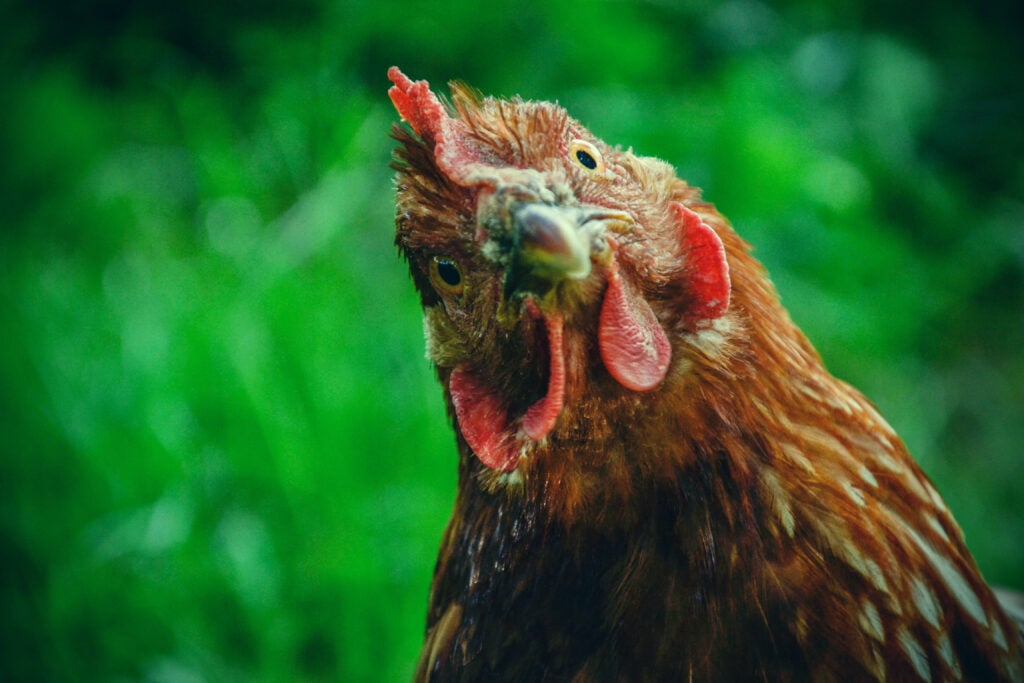Many of the ways that are commonly used to talk about nonhuman animals are negative. Certain words and phrases erase their individuality or describe them as commodities rather than sentient beings. This language is speciesist.
Just as we should be conscious of the language we use to describe other human beings so as not to diminish or denigrate them, so too should we be careful of the language we use about animals. This is not because their feelings will be hurt by it, but because it influences how they are perceived and treated in society.
What is speciesism?
Speciesism is a form of prejudice which views humans as being superior to other species. This belief in human superiority is often used to justify the use of animals for human ends, such as eating them or using them in experiments.
The term was first coined by animal activist Richard Ryder, but popularized by philosopher Peter Singer. Singer argued speciesism in his book Animal Liberation, pointing out that there is no inherent reason that human interests matter more than those of other species.
Speciesist attitudes are widespread. This is evident in the vast number of animals killed for food every year and the fact that animals are legally considered as property in most countries. It is also clear that humans value some animal species more than others. For example, dogs are given more moral consideration in western countries than pigs, despite pigs sharing many traits with dogs including intelligence and sociality.
Speciesist language
Speciesism is not just apparent in how humans treat animals but also in how we talk about them. Research shows that speciesist language is a widespread social phenomenon.
Some of this language is in the form of negative words used to describe animals, such as “greedy pig.” Other speciesist language is about the words used in relation to how animals are treated by humans. Some is harder to identify because it isn’t overtly negative, but still serves to devalue animals.
Here we explore some examples of common speciesist language that even animal advocates might be unconsciously using, and suggest ways of correcting it.
Pronouns

Referring to animals as “it” instead of “he,” “she,” or “they” is extremely common. It may often slip out without a person even realizing they are doing it. But using pronouns that you would also use for a car or a hammer objectifies animals.
People are more likely to use specific pronouns for animals whose names are known, such as a dog. But an animal whose name and sex is not known will most likely be called “it.” This would sound rightly offensive if used for a human, for whom we say “they.”
Other relevant words to watch out for in this context are relative pronouns, i.e. “which” and “who.” For humans, we say, for example, “a man who is tall” but for objects it would be “a car which is small.” Using “which” to talk about animals objectifies them the same as using “it” does. So “who” should be used instead.
In 2021, In Defense of Animals and Animals & Media coordinated a letter to the Associated Press (AP) urging it to update its journalistic guidelines to use personal pronouns for nonhuman animals. The AP is yet to adopt the recommendations.
Pet and owner
In 2020, PETA riled up Piers Morgan on Good Morning Britain by suggesting that people should stop using the word “pet” for their animals. “We’re encouraging people to use a better word like companion,” said Jennifer White, Media and Communications Manager at PETA.
Many ethical vegans have already made the suggested switch to saying “companion animal.” This is because “pets” are considered to have “owners,” implying that the animals are property. Legally, they are property, but animal advocates would argue that this status, and its associated terminology, is speciesist. As with impersonal pronouns, it turns them into objects rather than individuals.
Another reason the term “pet” could be seen as speciesist is that it doesn’t capture the reality of the relationship most people have with companion animals. People often consider their companions to be members of their family and not as possessions or playthings. By contrast, a “pet” sounds like something kept for a person’s own amusement rather than a sentient being with their own inner life.
“Companion” feels more appropriate to the kind of relationships people have – or should have – with animals in their care. For the same reasons, “guardian” is a preferable term to “owner.”
Fish, and other singular nouns for many animals

For some animals, the plural form of noun is commonly the same as the singular. People usually say “fish” and “sheep” whether they mean one or many animals. Swine, cattle, and poultry are other examples, though these are more commonly used in the meat industry than in everyday language.
It’s becoming increasingly popular to emphasize their individuality by using “fishes” and “sheeps.” Similarly, it is better to use “cows” instead of “cattle,” “pigs” instead of “swine,” and “chickens/ducks/turkeys” instead of “poultry.”
“Livestock” is another word that not only erases the individuality of animals, but additionally emphasizes their status as commodities. “Lives Not Stock” – the name of a campaign by Animal Justice Project to ban live animal exports – succinctly captures what’s wrong with the term.
Farm animals
“Farm animals” identifies animals by the captive state they have been forced into. It suggests that being farmed is somehow inherent to their existence, which it isn’t, even if farming is the reason they were initially bred. The term is also associated with misleading narratives and imagery about what life is like for animals kept on farms.
Some animal advocates prefer “farmed animals” to indicate that farming is something that isn’t being done to them. Others prefer “animals who are farmed.”
Euphemisms
Euphemistic language to talk about animals used for food are plentiful and ubiquitous. This language makes the reality of farming, killing, and eating animals seem far more benign than it actually is. This is speciesist because it makes the harm done to animals for human ends seem acceptable.
Some of these words are the ones used to describe the products of animal agriculture, for example pork, beef, steak, and veal. These dissociate the pieces of meat from the animals they were taken from, as Carol J. Adams explains in her book The Sexual Politics of Meat.
Other euphemistic language used to downplay the violence done to animals in the meat industry includes that about how they are farmed and killed. Mutilations carried out to make it easier to intensively farm animals often have technical or clinical-sounding names that hide the violence involved. Cutting off the tails of piglets, usually without pain relief, is called “tail docking” while cauterizing the horn buds of young cows is called “disbudding.”
When fishes are dragged out of the ocean in nets, this is usually called “harvesting” and they are described as “catch.” Animals killed in slaughterhouses are “processed” – and slaughterhouses are sometimes called “processing plants.”
“Depopulation” is used when animals are killed en masse at a farm. This may be done to contain disease, such as in the case of chickens and avian flu, or in situations such as a shortage of workers to “process” the animals.
Respecting animals
We can show animals more respect by using language which appropriately reflects the fact that they are sentient beings. We should also be honest in the language we use to describe how the things that are done to them to the benefit of humans. Otherwise we help to hide the reality of it, which is often violent and cruel.






